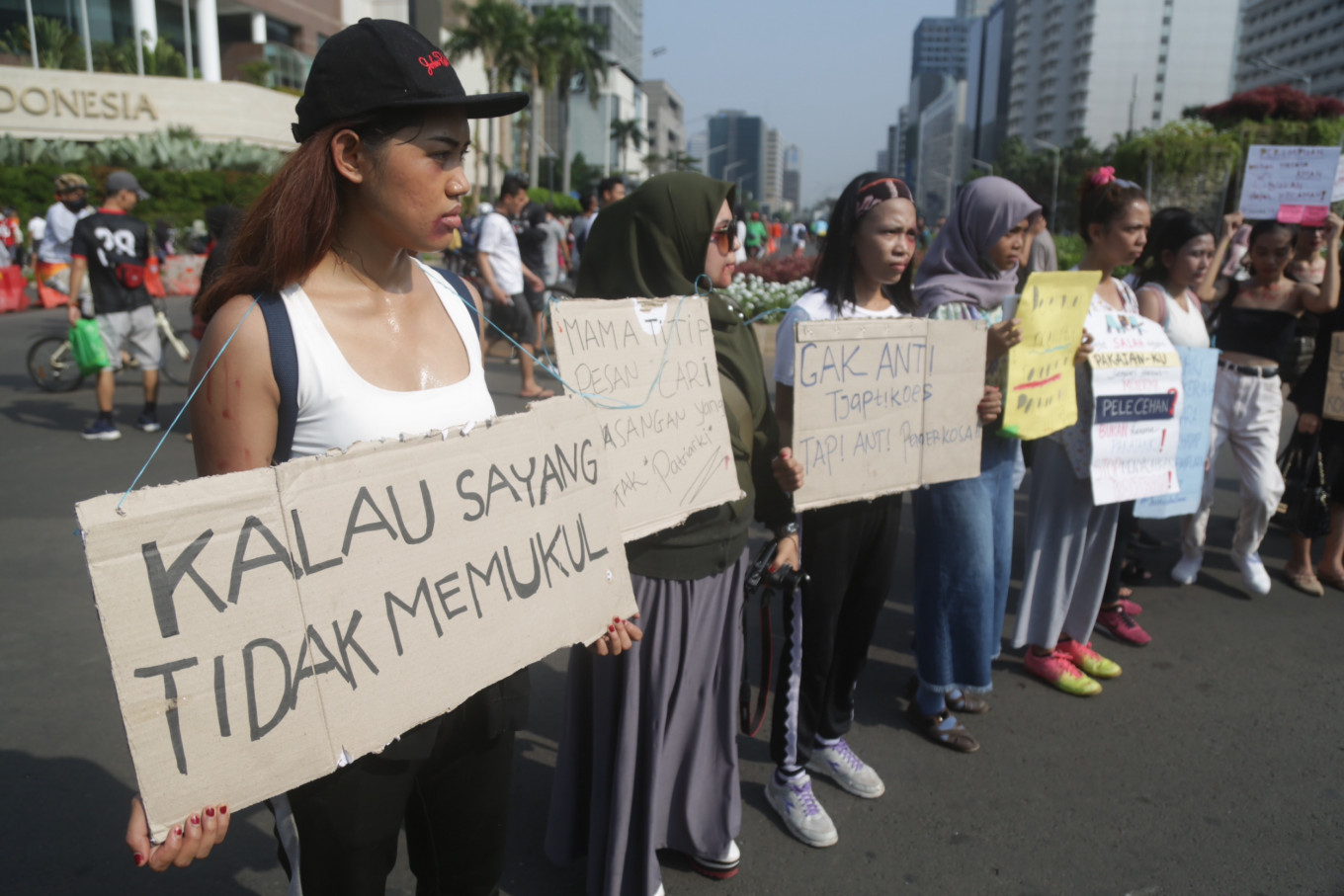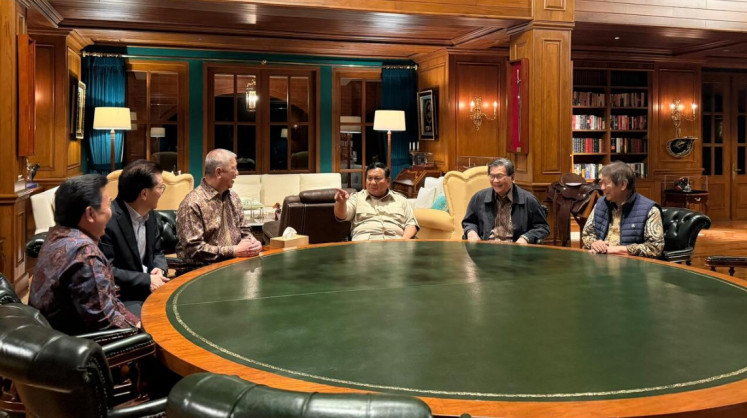Popular Reads
Top Results
Can't find what you're looking for?
View all search resultsPopular Reads
Top Results
Can't find what you're looking for?
View all search resultsFinding Indonesia’s everyday heroes and marking the week of International Women’s Day
Women often bear a significantly larger portion of the burden, while also maintaining jobs in either the formal or informal sector.
Change text size
Gift Premium Articles
to Anyone
E
very morning forest ranger Ebiprila Hasan leads a routine expedition to protect the rich wildlife at a national park in Indonesia’s Southeast Sulawesi. Across the sea in East Java, recycled plastic entrepreneur Nurul Latifah mobilizes garbage collector communities, informing them the dangers of highly toxic substances emitted from discarded electronic devices.
Beating the odds and leading the way for change are many other remarkable but little-known women like Hasan and Latifah, the latter being a survivor of domestic violence. Both embody the spirit of this week’s International Women’s Day (IWD), which recognizes inspiring women’s leadership during the COVID-19 pandemic.
UNDP Indonesia, which was recently awarded the Gold Gender Equality Seal for its strong commitment to gender equality, has had the privilege to work with these incredible figures through our Sustainable Development Goals (SDG)-driven projects.
We have heard first-hand the adversities they faced and how they broke free of visible and invisible restrictions placed on them to improve their lives, empower their peers and serve as role models for many. As we mark IWD week – and Women’s History month — we must recognize the existing hurdles preventing other Indonesian women from fulfilling their potential.
Hasan and Latifah may be miles away apart, but their background and experiences are united by similar overlapping themes of having endured domestic violence and growing up in poverty with little social protection.
These two underlying factors have become more pronounced during the COVID-19 pandemic.
As part of our week-long observance of International Women’s Day, UNDP Indonesia and research center Abdul Latif Jameel Poverty Action Lab (J-PAL) Southeast Asia on Wednesday launched a report that looks at the prevalence of domestic violence and the state of unpaid care work during the pandemic among 1,000 respondents in Indonesia’s eight cities.
Our study reveals that 42 percent of respondents – both men and women - have experienced an increase in domestic abuse during the pandemic, an incidence that is similar across regions with and without social restrictions. The inability to make ends meet, becoming unemployed, having an unemployed spouse and the need to assist children with their schoolwork are cited as triggers for violence.
Another study by the Indonesian National Commission on Violence Against Women reports that domestic violence contributed to almost two-thirds of 319 reported cases of violence during the first three months of the pandemic.
The prevalence of gender-based violence is not unique to Indonesia, nonetheless the proportion is higher by seven percent compared to the global figure at 35 percent. But gender-based violence is never acceptable. On a deeper level, addressing the issue involves addressing the structural barriers and discriminatory practices that deny women equal rights.
Our study with J-PAL Southeast Asia also revealed that the pandemic has forced many women to bear the brunt of the burden of unpaid work. Women respondents say they spent an average of 3.7 hours a day for domestic work and 2.5 hours for child-rearing activities, compared to men who spent under 2 hours on domestic work.
While there have been growing incidences where women and men are engaged in care work – defined as work involved toward taking care of family members, children, older individuals and the household at large – it is unequally distributed between women and men, as is the balance between work and home work. Women often bear a significantly larger portion of the burden, while also maintaining jobs in either the formal or informal sector.
A good first step toward addressing this discrepancy is to recognize care work as contribution to the national economy, or gross domestic product (GDP), and for governments to invest in the sector. This is so that women who may have been performing this work for most of their lives can make an income, thereby raising household incomes, and improving overall living standards.
Having more women at the helm of policy development will greatly help put this strategy into action, especially at these times of recovering from COVID-19 pandemic and building forward better. While Indonesia has done well in this regard— ranking fourth globally with the most women leaders in 2020 — leadership across all levels is imperative to ensure that women’s voices are heard and that their needs are met.
At this time, with the growing concerns of inequality and climate change, we must elect more women to high office to ensure we leave no one behind. Strengthening women’s leadership for social cohesion, and empowering women will help increase community resilience.
Another key driver that could remove barriers, particularly during the pandemic, is the implementation of social protection policies which address women’s needs while coping with the larger issues of poverty and inequality.
Last week UNDP released an eye-opening report on temporary basic income, which calls on governments to provide bolder support for women during the ongoing COVID-19 pandemic. Entitled, “Protecting Women’s Livelihoods in Times of Pandemic: Temporary Basic Income (TBI) and the Road to Gender Equality”, our report argues that if governments in developing countries could invest at least 0.07 percent of their GDP into temporary basic income, then up to 2 billion women could be better protected. To quote UNDP’s Administrator Achim Steiner, this much-needed monthly income “could ensure survival in these unprecedented times”.
This social safety net option, along with women’s empowerment programs and greater access to social services, can help cushion the impact of crisis and harness support in the event of future situations. Despite setbacks experienced during the pandemic, we must seize the opportunity to encourage more women to take the reins, step forward and lead us as we build forward better.
There are countless untold stories of incredible Indonesian women like forest ranger Hasan and businesswoman Latifah. We may never be able to hear all those stories, as they continue to stand up and become trailblazers in their communities. However, we should – as the IWD 2021 theme reminds us – strive to remove structural barriers, gender discrimination, and prejudice, which have prevented many women from becoming everyday heroes.
***
Norimasa Shimomura is UNDP Indonesia resident representative and Sophie Kemkhadze is UNDP Indonesia deputy resident representative.










